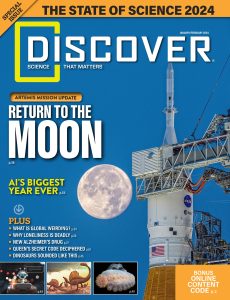
Discover – January-February 2024
English | 70 pages | pdf | 17 MB
WELCOME ONCE again, friends, to Discover’s annual State of Science issue, where our editors and writers bring you the biggest and most intriguing science stories of the year.
While every story here deserves your attention, a few stood out for me as we were preparing this issue. Although it’s still early days, I’m excited for the promise of the Artemis program (page 48). I grew up at the tail end of the Space Race, so I confess that I’m hopelessly besotted with the idea of humankind’s return to the moon. My excitement is driven by more than nostalgia, though, just as NASA and its various Artemis partners are driven by so much more than the desire to repeat the triumphs of the Apollo landings of the 1960s and ’70s.
If the missions proceed as planned, I’m eager to see new science, new discoveries, and new lunar firsts, including the establishment of a long-term moon base and, in orbit, the Gateway space station that will set the stage for an eventual crewed journey to Mars.
Meanwhile, back on Earth, artificial intelligence definitely had more than a moment this year. You’ll see that reflected in our coverage, chiefly with writer Stephen Ornes’ overview of the year in AI (page 64). In the popular consciousness, much has been made of the potential and pitfalls of using (or abusing) AI in various fields. New Stephen C. George, Editorial Director
Feel free to send comments and questions to [email protected] advances in science and technology do tend to raise various concerns and fears. I try to be an optimist, though, and remind myself that, as a tool used well and wisely, AI has the power to change lives for the better. Perhaps nowhere in this issue is that better reflected than in Avery Hurt’s story on page 62, which highlights an astounding merger of medicine and technology. Employing a “digital bridge” — an interface that uses AI to translate brain signals into electrical impulses — researchers enabled a man to stand and even walk again despite a major spinal-cord injury.
And those are just two of the dozens of stories you’ll find in this issue. I hope you enjoy them all, and are just as fascinated by the current state of science as I am.
Stephen C. George, Editorial Director
Feel free to send comments and questions
to [email protected]
Download from: